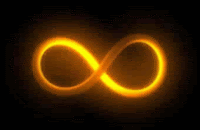 I like the idea of multiple infinities. The notion of a bound infinitesimal, an infinite space between, a finite area in which there exists no biggest, no smallest -well, it seems to reflect real life. Scientists can travel deeper and deeper into the small -the cell, the organelle, the molecule, the atom, the subatomic particle, the bodies of quantum mechanics- and yet never be satisfied that they've reached the smallest (and if they do declare that they've discovered the smallest there is, they are inevitably proved to be wrong by consequent discovery). The same holds true when we see how big we can go. We'll call it the universe, the term for "everything." And then red shift suggests that that "everything" is expanding... into something bigger.
I like the idea of multiple infinities. The notion of a bound infinitesimal, an infinite space between, a finite area in which there exists no biggest, no smallest -well, it seems to reflect real life. Scientists can travel deeper and deeper into the small -the cell, the organelle, the molecule, the atom, the subatomic particle, the bodies of quantum mechanics- and yet never be satisfied that they've reached the smallest (and if they do declare that they've discovered the smallest there is, they are inevitably proved to be wrong by consequent discovery). The same holds true when we see how big we can go. We'll call it the universe, the term for "everything." And then red shift suggests that that "everything" is expanding... into something bigger. Yes, I like the idea of infinities. It reflects the multiple unknowns that exist, rather ubiquitously.
One question: if infinity is defined as everything that possibly exists, how could there be multiple ones by definition?
ReplyDeleteLogically, there must be a prime matter, too, because I don't think you can have "elephants all the way down."
Should philosophy serve as a corrective to scientific discovery - especially in areas scientists have not yet reached. Personally, I think philosophy should have the authority to critique science especially when delving into absolutes such as infinity.
I need to make a small correction. Infinity is actually more than everything that exists given that existence is finite and is based in the infinite. Of course, is everything that exists finite? Is the universe (or multiverse) finite resting in the Infinite?
ReplyDeleteAnd does the Infinite include all that has the potential to exist?
Delete